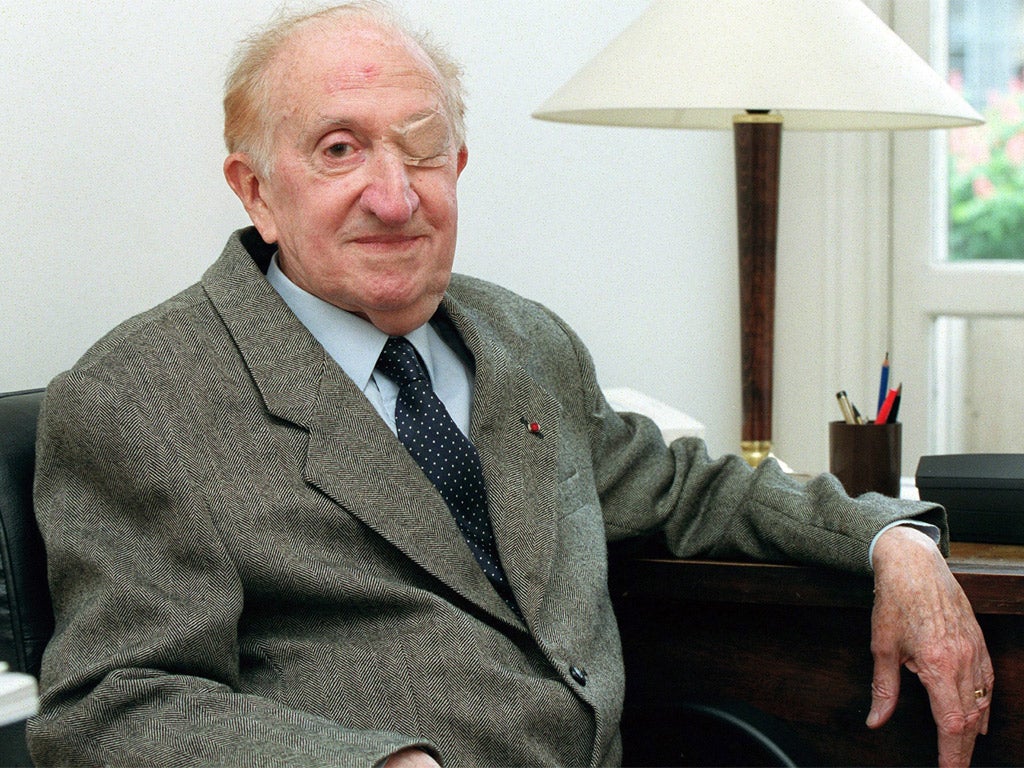Paul Aussaresses: General who fought in the Algerian war for independence and in retirement was tried for defending the use of torture

Paul Aussaresses was a French army general who in the final years of his life dispassionately revealed the torture techniques he employed during the Algerian war for independence and defended them as appropriate measures in the modern age of terrorism. Aussaresses spent nearly his entire career in the service of his country's military. He was described as a hero of the Second World War and fought in the French Indochina War before being posted to Algeria at the outset of the anticolonial rebellion there in 1954.
The insurgency raged on until Algeria gained its independence in 1962. Five decades later, the war and its prosecution remain the subject of intense soul-searching in France. Aussaresses was chief of French military intelligence during the Battle of Algiers, the uprising in the Algerian capital in 1956 and 1957. Working under General Jacques Massu, he helped put down the guerrillas who had been radicalised by past abuses perpetrated by their colonial rulers. The rebellion continued in other regions, however, and the French victory in Algiers came to represent the folly of winning a battle but losing the war.
In 2001, long after his retirement, Aussaresses made international headlines with the publication in France of a memoir later translated into English as The Battle of the Casbah: Terrorism and Counter-Terrorism in Algeria 1955-1957. The book detailed the torture and summary executions in which he had taken part, and they provoked uproar in France. The then-President Jacques Chirac said he was "horrified" by the book's contents.
"The methods I used were always the same: beatings, electric shocks, and, in particular, water torture, which was the most dangerous technique for the prisoner," Aussaresses wrote. "It never lasted for more than one hour and the suspects would speak in the hope of saving their own lives."
He wrote that he was "indifferent" to the executions of his adversaries and that some deaths were concealed as suicides. "If I myself went on to carry out these summary executions," he said, "it was because I wanted to assume personal responsibility. I didn't want to make someone else do the dirty work."
Aussaresses contended that French government officials, including the then-justice minister and future president François Mitterrand, were aware of and condoned the use of torture in Algeria. Confronted by an international outcry, Aussaresses insisted on the rightness of his actions.
"I express regrets, regrets, regrets," he said. "But I cannot express remorse. That implies guilt. I consider I did my difficult duty of a soldier implicated in a difficult mission."
Writing in The New Republic, the human rights and international affairs scholar and former politician Michael Ignatieff argued that the book was notable not for its specifics but for the author's perception of their meaning "What was distinctive about Aussaresses," Ignatieff wrote, "was his jaunty impudence about the whole issue, his insistence that he had no regrets and that he would do it again in the context of the contemporary war on terrorism."
Months after the release of the book, and amid intensifying national outrage, Aussaresses was charged in a French court with "complicity in justifying war crimes." He stood trial for having been an apologist for the torture techniques – not for having used them, as long-standing amnesty legislation protected French veterans of the Algerian conflict. He was convicted and fined €7,500. His publishers were fined twice that amount and he was stripped of his Légion d'Honneur award.
During the trial, Aussaresses was asked by an American interviewer if Zacarias Moussaoui, a conspirator in the terrorist attacks of 11 September 2001, should be tortured for information. "It seems to me," he replied, " that it is obvious."
Aussaresses was born in 1918, in Saint Paul Cap de Joux, in southern France, and trained at the Saint-Cyr military academy. He was an officer cadet in Algeria during the Second World War before joining the Free French Forces and parachuting to the aid of French resistance fighters in German-occupied territory in Europe.
After his assignment in Algeria, he was a military attaché in Washington and lectured US Army Special Forces at Fort Bragg, North Carolina, He was later an adviser to several Latin American governments.
Aussaresses wore a patch over his left eye and it had been said over the years that he had lost the eye during the war. At the time of his death, however, it was reported that the cause had been a failed cataract operation.
Aussaresses acknowledged that many observers wanted him to display repentance but said that he could not. "If tomorrow and every day bombs went off in Paris stadiums, cafes, or elsewhere, do you think the government and police would fight back with classic means?" he said. "When one has seen, like I have, civilians, women, children, dismembered or nailed to a door, you are marked for life."
Paul Aussaresses, soldier: born Saint Paul Cap de Joux, France 7 November 1918; married (children); died 4 December 2013.
© The Washington Post
Join our commenting forum
Join thought-provoking conversations, follow other Independent readers and see their replies
Comments